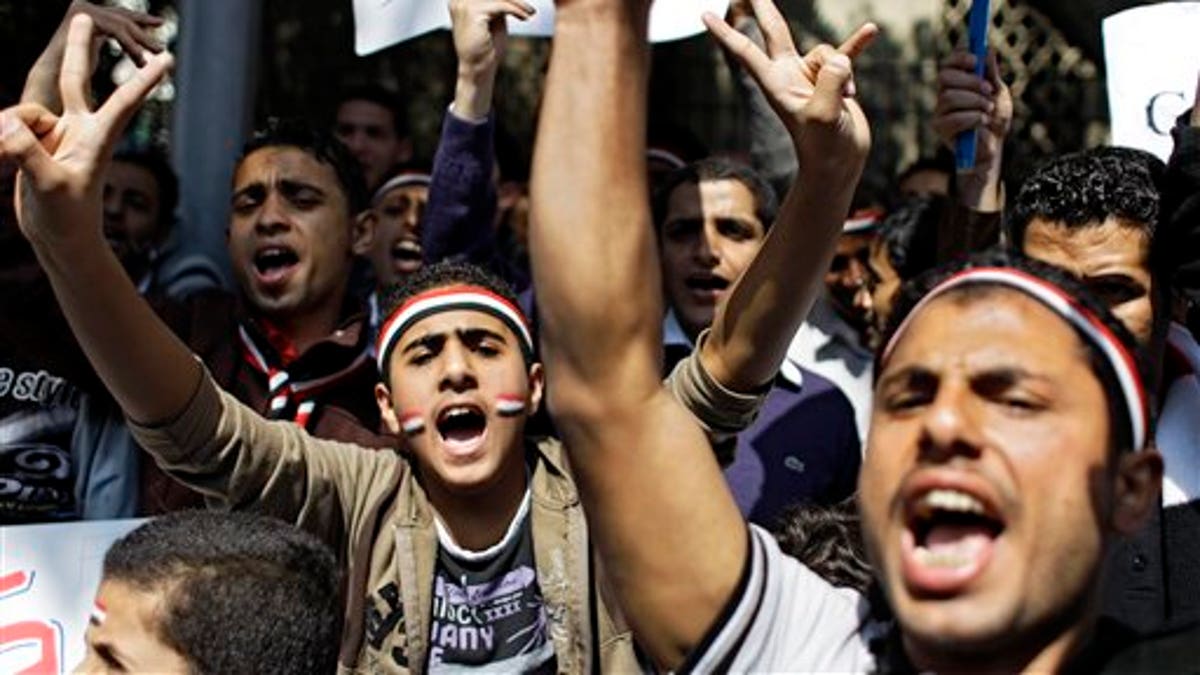
March 12: People shout slogans as they protest outside the Arab League headquarters in Cairo, Egypt, to urge Arab foreign ministers meeting to approve a no-fly zone over Libya to protect the civilian population from Libyan leader Muammar Qaddafi's fighter jets. (AP)
A proposal to establish a no-fly zone over Libya has been introduced to the U.N. Security Council, though both its chance of passage and effectiveness even if it does pass are very much in doubt.
The resolution would provide political and legal authorization for the establishment of a no-fly zone over Libya, strengthen existing economic sanctions -- including a more robust enforcement of an arms embargo -- and expand a list of individuals, organizations and companies that are subject to travel bans and to the freezing of assets from Libya. The draft also calls for a ban on the use of commercial flights to transport mercenaries into the country and other means to end the involvement of foreign fighters.
The move comes as forces loyal to Muammar Qaddafi have used airpower and tanks with devastating effect against the rebels, who are losing ground in their battle to unseat the longtime dictator.
"It may prove to be too little too late," says Robert Danin, a senior fellow at the Council on Foreign Relations. "It could be of some assistance in creating humanitarian sanctuaries, but if the goal is to roll back Qaddafi's forces, it is likely to have little military effect, especially with the rebel stronghold of Benghazi on the brink of falling."
Even though the U.S. is now backing the draft Libya resolution, Danin believes the Obama administration should have pushed harder for action much earlier. "Obama should not have called for Qaddafi to step down if the U.S. was not willing to back up that call with a real sense of an ‘or else' ... consequences for failing to step down.”
The resolution comes amid criticism of the Security Council’s failure to react more forcefully. French U.N. Ambassador Gerard Araud said he is "deeply distressed" by the Security Council's failure to act and is pushing for the resolution’s passage. But Western diplomats tell Fox News they expect tough negotiations over the days ahead.
China, which has a Security Council veto, remains rather cool to the idea of a no-fly zone resolution. Facing its own civil unrest and separatist movements, Beijing also wants to safeguard its construction and oil contracts with the Qaddafi regime. Russia, another permanent Security Council member with veto power, has also expressed misgivings about how a no-fly zone would work, and who would participate in its enforcement.
"You need to be sure any decision the council takes is not going to exacerbate the military-political situation in Libya," said Russian Ambassador Vitaly Churkin.
Alarmed by the intensified fighting in Libya, the British and French last week prepared a draft no-fly zone resolution but lobbied for the backing of the Arab League before moving forward. That endorsement came over the weekend, when the Arab League called for an end to aerial bombardments in Libya. Lebanon, the Arab League's representative on the Security Council, is now playing a central role in pushing the current resolution.
"Our hope is that the establishment of a no-fly zone would have a deterrent effect on the Qaddafi regime," Ambassador Nawaf Salam said, adding that the hope is that military force wouldn't be necessary.
